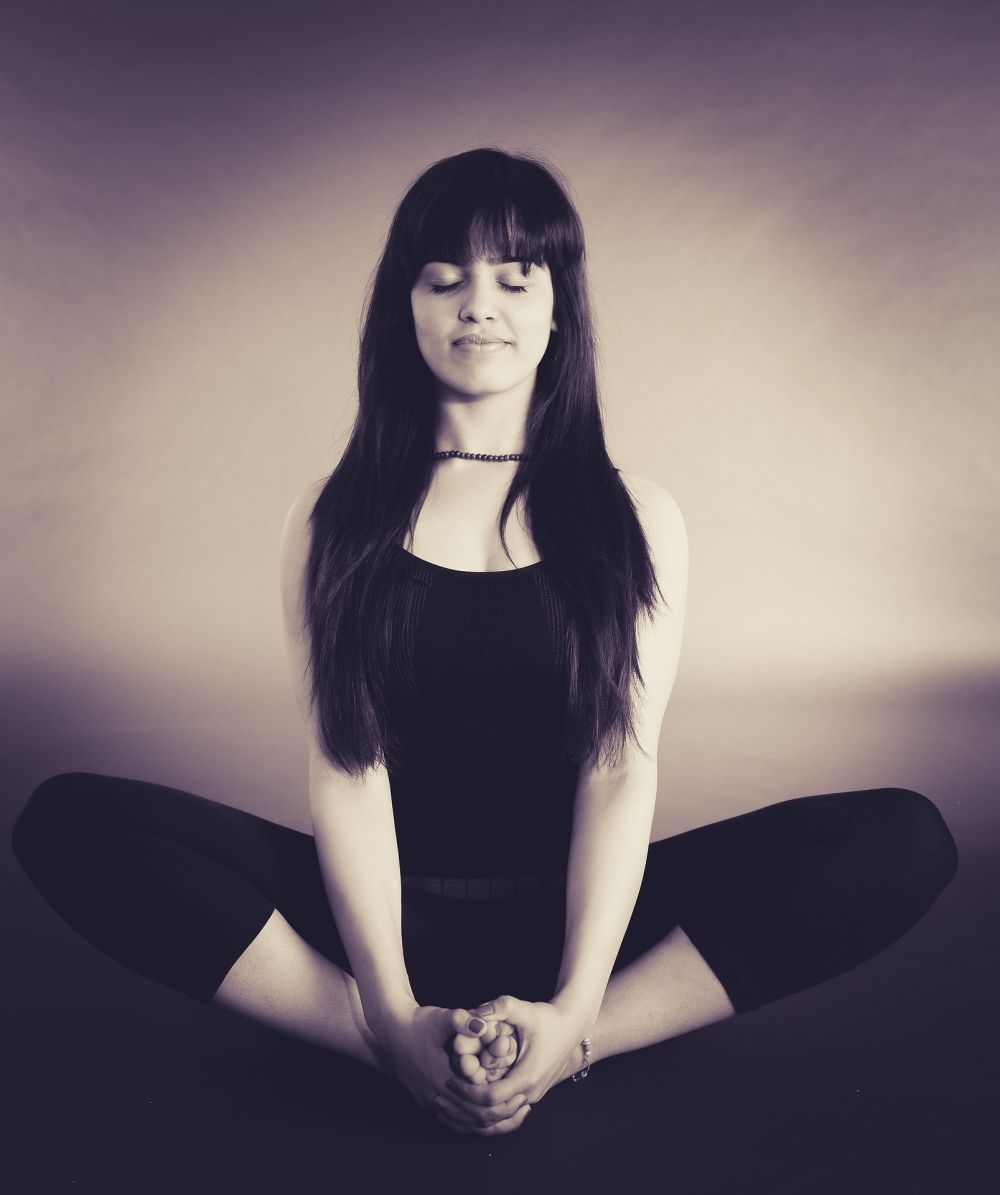
Practicing yoga regularly is an amazing way to get better sleep at night by relieving stress. You can ease into a restful night easily and revitalize your body, mind, and soul through yoga.
A restorative type of yoga provides basic exercises that improve your life. People tend to spend less and less time sleeping. Unfortunately, it can have tremendous negative effects on your health and well-being.
By increasing your sleep quality, you avoid sleep deprivation and its consequences, such as weight gain. A restful night is easily achievable with a quiet yoga practice.
Focus on deep breathing, calming your mind, and releasing any tension. The following tips will help you relax, get rid of stress and anxiety for maximum energy in the morning.
Panaprium is independent and reader supported. If you buy something through our link, we may earn a commission. If you can, please support us on a monthly basis. It takes less than a minute to set up, and you will be making a big impact every single month. Thank you!
The different causes of insomnia

There are many possible reasons for lack of sleep. They should be treated as soon as possible.
A major cause of poor sleep quality is the lack of an effective nighttime routine. Properly tell your body when it is time to sleep to guarantee a restful night.
Avoiding anything that will give you a boost of energy is necessary to sleep better. Calm down and avoid taking any stimulants at night to fall asleep easily.
Avoid getting any excitement from movies or music. Watch or listen to something that will help you relax instead.
If you have a sleeping schedule that varies a lot, it might be the cause of bad sleep quality. Sleeping during the day is not advised. Disrupting the biological clock as rarely as possible is essential for better sleep quality.
Make sure that you try to sleep at least eight hours each night. The lack of sleep can cause the body to have difficulty sleeping in the future.
How to sleep better and deeply
Digestion is sometimes a root cause of insomnia. Sleeping and eating should be two completely separate activities with a few hours gap between them.
Finish your last meal of the day at least two hours before heading to bed. The digestion must finish before the body can rest.
Stress is another major cause of insomnia. Sleep deprivation is the result of feeling stressed out or anxious. Racing thoughts prevent falling asleep and restful nights.
What happens when you lack sleep
During the day, while being fatigued, there is a higher risk of depression and cognitive deficiencies. Resting enough every night is important to avoid the following consequences:
- Anxiety
- Depression
- High levels of stress
- Weak immune system
- Weight gain
- Diabetes
- Heart diseases
- Reduced longevity
- Poor mood
- Memory problems
- Lack of concentration
- Hallucinations
How yoga helps you sleep better

Yoga is one of the best exercises you can do to fight insomnia. It's very effective to calm your body and your mind. Yoga helps you sleep better and restfully.
With a few yoga techniques, you can easily relax and calm down after a busy day. It doesn't take long and is very helpful to ease into sleep.
Yoga combines different postures (asanas), breathing exercises (pranayama), and meditation (dhyana).
If you practice yoga regularly, you will see positive changes in yourself, such as feeling refreshed and rejuvenated. If you have trouble sleeping, yoga will help you stop worrying too much.
Sleeping is essential for the body to heal, repair itself, and regenerate its cells. Try to get at least 8 hours of sleep every day.
Practicing yoga often treats insomnia, abnormal sleeping habits, and many other disorders. It improves physical and mental well-being. And you don't need to practice for hours to reap its benefits.
Even a short and gentle sequence at home has a tremendous impact on your health and well-being. Take a few minutes for yourself to practice and feel comfortable before a great night's sleep.
Yoga can lower stress levels, calm the mind, and relieve tension in the body. It's a great natural sleep remedy and many poses are particularly powerful for combatting restlessness and insomnia.
They have positive effects on the nervous system and help you with relaxation. A pre-bedtime yoga practice should be part of your nighttime routine for better sleep.
Stretching in general has a calming effect. By focusing on the body and the breath, you liberate your mind from worrying thoughts.
Here are the best yoga poses to calm down, relax, and have sublime sleep at night.
1. Savasana (Corpse Pose)

- Lie on your back, letting your legs and arms relax
- Let your legs and arms relax
- Bring your attention to your breath and notice which nostril is clearer
- To come out of the pose, draw your knees in toward your chest
- Instead of automatically rolling to your right side, roll onto whichever side has the clearer nostril
- Stay there until both nostrils feel equally clear
2. Siddhasana (Accomplished Pose)

- Sit with your back straight
- Line up your ankles
- Press one heel on the inner thigh
- Touch the ankle bones together
- Softly close your eyes
- Tune in to the rhythm of your breath and become aware of your heartbeat
- Inhale and lengthen your spine as much as possible
- Exhale and root down through your seat
- Rest your hands on your knees, with index fingertips touching thumbs
3. Supta Virasana (Reclining Hero Pose)

- Sit on your shins and place a bolster against the base of your sacrum
- Separate your ankles and sit between them
- If needed, bring your knees as wide as your hips
- Rest back onto your bolster, supporting your head with a blanket
- Place your arms on the floor, palms facing up
4. Baddha Konasana (Bound Angle Pose)

- Sit down, and lace a bolster at the base of your sacrum
- Bend your knees and place the soles of your feet together
- Allow the knees to open and relax
- Slowly place your knees on the ground
- Bring your heels to the perineum
5. Paschimottanasana (Seated Forward Bend)

- Sit tall on the edge of a folded blanket with your legs extended
- Keep your feet together
- Exhale and stretch your spine long as you fold forward
- Keep your legs and your spine lengthened
- Touch your forehead to the knees
- Reach as far as you can with your hands
- Hold onto your feet or shins, with your elbows bent and arms relaxed
- Rest your forehead on a block
6. Uttanasana (Standing Forward Bend)

- Stand straight with feet hip-width apart and a slight bend in the knees
- Hold your elbows with both hands
- Exhale, fold forward, and lengthen down through the crown of your head
- To come up, release your arms, root through your feet, and slowly rise
7. Balasana (Child's Pose)

- Sit up comfortably on your heels
- Roll your torso forward, bringing your forehead to rest on the bed in front of you
- Lower your chest as close to your knees as you comfortably can, extending your arms in front of you
- Hold the pose and breathe
To wrap it up
Try to calm down and relax so your body can fall asleep. Yoga helps you with that and is accessible to everybody, even complete beginners.
Take a few minutes before bedtime to practice a few exercises. Yoga will have a positive impact on your health and well-being. It will benefit you in the long run.
Was this article helpful to you? Please tell us what you liked or didn't like in the comments below.
About the Author: Alex Assoune
What We're Up Against
Multinational corporations overproducing cheap products in the poorest countries.
Huge factories with sweatshop-like conditions underpaying workers.
Media conglomerates promoting unethical, unsustainable products.
Bad actors encouraging overconsumption through oblivious behavior.
- - - -
Thankfully, we've got our supporters, including you.
Panaprium is funded by readers like you who want to join us in our mission to make the world entirely sustainable.
If you can, please support us on a monthly basis. It takes less than a minute to set up, and you will be making a big impact every single month. Thank you.































0 comments